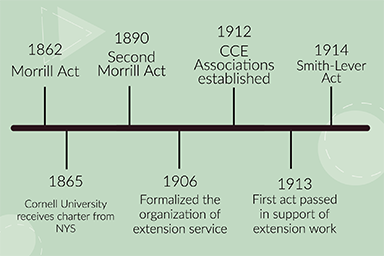In 1862, just weeks after the passage of an act creating the United States Department of Agriculture, the U.S. Congress and President Abraham Lincoln provided for the establishment of colleges to teach agriculture in the Morrill Act of 1862. The land grant university for New York State, authorized by this act, is Cornell University, which received its charter from the State of New York in 1865. The Second Morrill Act of 1890 increased the federal financial support for land-grant colleges.
Liberty Hyde Bailey, dean of the New York State College of Agriculture, formalized the organization of the extension service in 1906. Under its auspices, groups of local farmers in NYS counties worked voluntarily, making arrangements for meetings and advising the college staff on the selection of topics and speakers.
The Smith-Lever Act of 1914 and Amendments is the foundation upon which the whole system of Cooperative Extension work is built. It provides comprehensive legislation and appropriate guidelines for extension work. According to the Smith-Lever Act, the subject matter scope for Cooperative Extension work is very broad across agriculture, home economics, and related subjects. In more recent decades, the Extension System nationwide has attempted to focus and prioritize to make best use of resources. Today, CCE works in the below major areas:
- Agriculture & Food Systems
- Community & Economic Vitality
- Environment & Natural Resources, Sustainable Energy, and Climate Change
- Nutrition, Food Safety & Security, and Obesity Prevention
- 4-H Youth Development & Strengthening Families
The New York State Legislature passed the first act in support of extension work in May 1913, appropriating $25,000 for the purpose of assisting in the organization of and contributing toward the support of county associations. This was the forerunner of County Law 224, which designates responsibility for supervision of extension programming to Cornell University and provides funding for programming in our focus areas.
Cornell Cooperative Extension Associations are vital partners in fulfilling the land-grant and extension missions of Cornell University. Established by state statute in 1912 as subordinate government agencies, county Extension Associations operate under memoranda of agreement with Cornell University (BR Agreement) to provide educational programming to residents of New York State.
Each Association is governed by a board of locally elected volunteers who are responsible for identifying their community’s educational needs, offering a mix of programs which address those needs, hiring qualified staff to develop and deliver programs, and securing adequate funds to support the work of the Association.
Fundamental to Cornell Cooperative Extension Associations is the idea that individuals and communities should be a part of decisions about educational programming that will affect them, and that a high degree of local involvement can inform the public work of the university. Also central to the system’s design is the idea that a strong partnership with local governments can strengthen and add to the support for Cornell and its extension programs that is provided by state and federal government. The Association - local government relationship is governed under the annual AR Agreement.

Additional Resources:
- What is Extension? (NIFA website)
- Cornell's Land Grant Mission
- Fact Sheet: What is a Cornell Cooperative Extension Association?
- Organizational Structure Chart
- County Law 224 (annotated)
- Foundational Documents of CCE in NYS
- Fact Sheet: Relationship Between CCE Associations and County Government
- Fact Sheet: Helping Board Members Understand the CCE Association Board of Directors
- What is the Land Grant System?